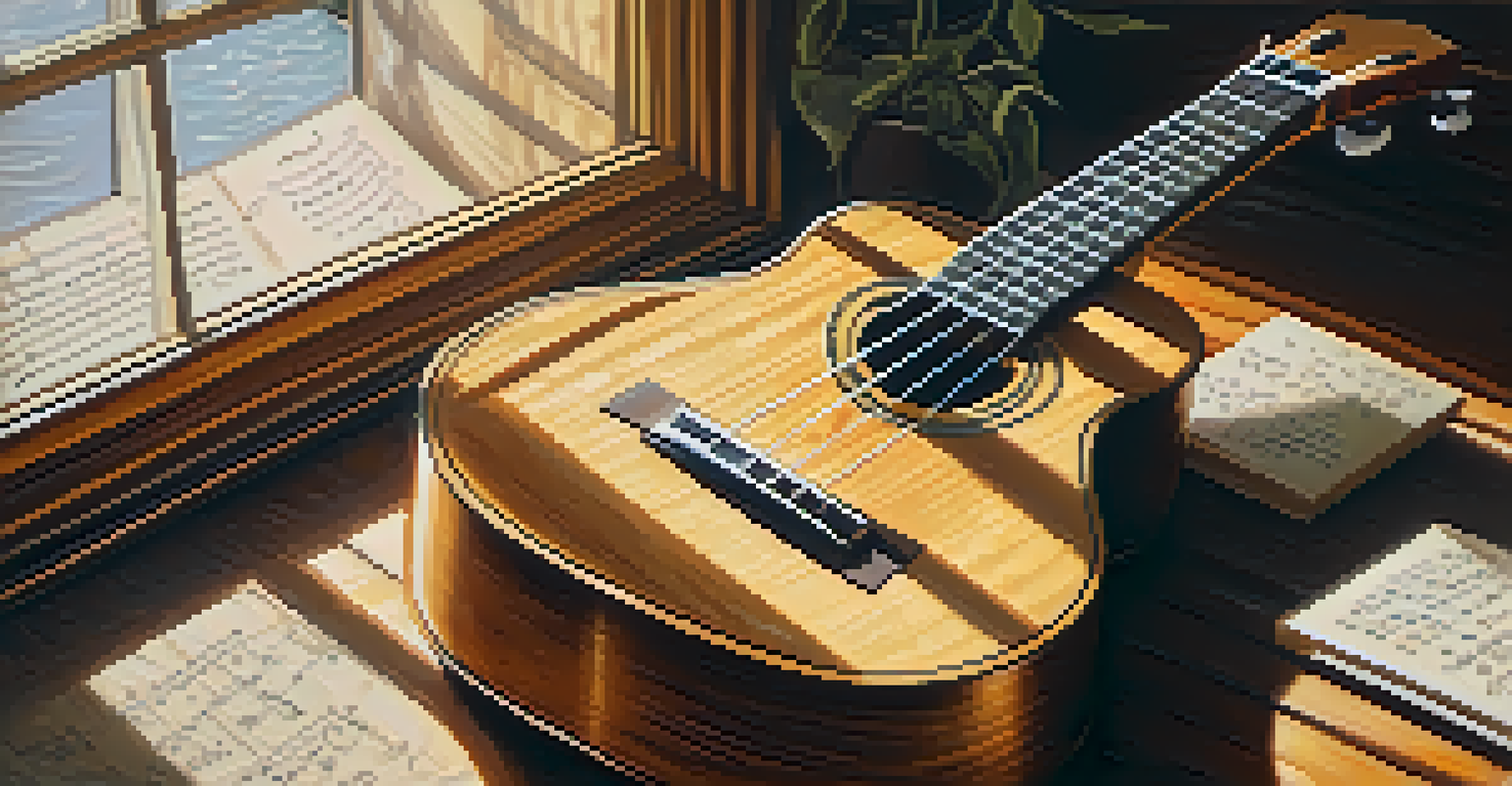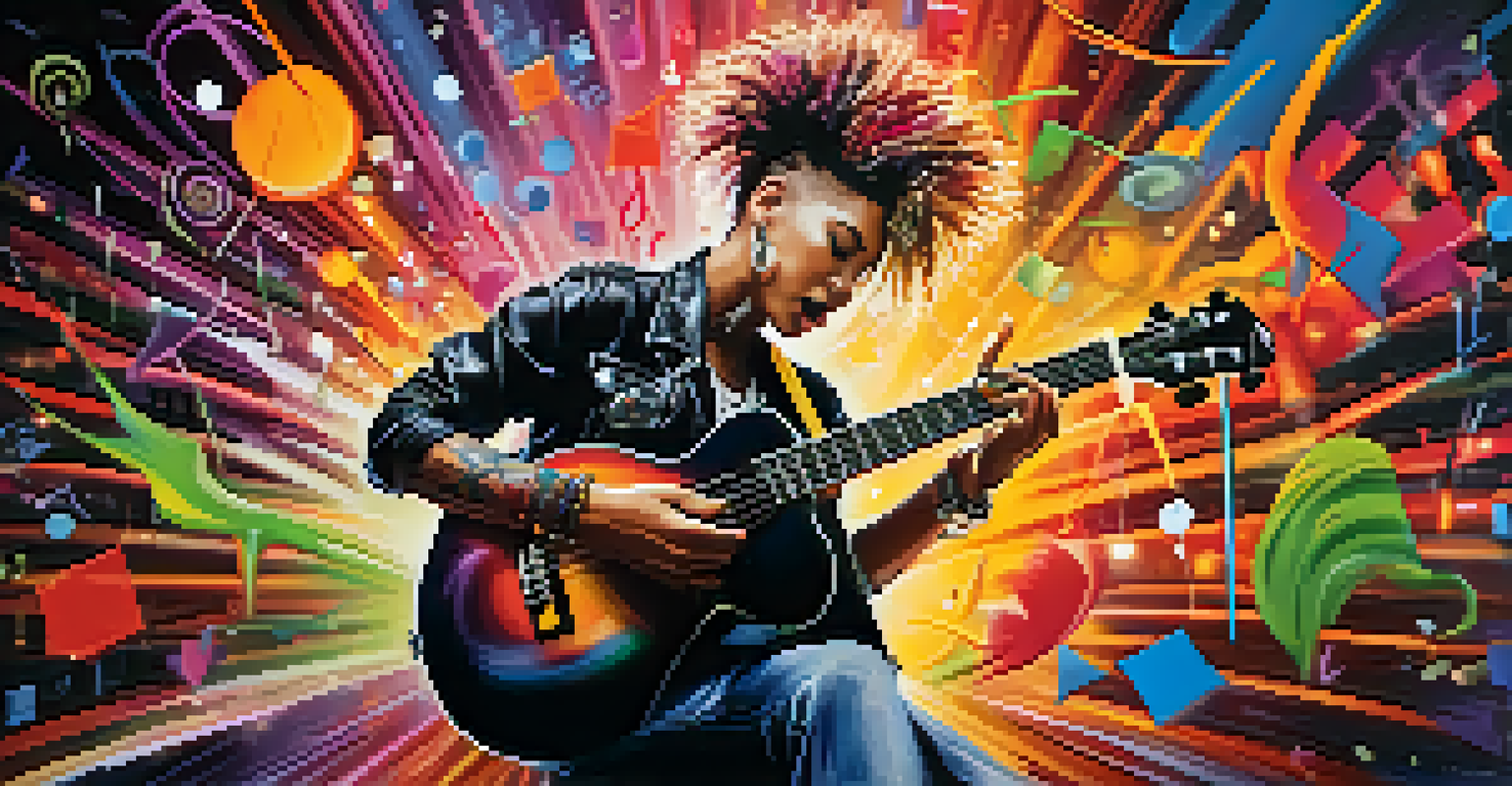Punk Rock and the Ukulele: A Clash of Cultures in Music

Understanding Punk Rock: Roots and Rebellion
Punk rock emerged in the 1970s as a response to the mainstream music scene, characterized by its raw energy and anti-establishment ethos. Bands like The Ramones and Sex Pistols harnessed a DIY spirit, often challenging societal norms through their lyrics and style. This genre was not just about music; it was a cultural movement that encouraged individuality and resistance to conformity.
Punk rock is not just music, it’s a way of life that encourages you to break the rules and be yourself.
The sound of punk rock is typically fast-paced, with distorted guitars and powerful vocals, embodying a rebellious attitude. Its simplicity is key, as many punk songs are built around three or four chords, making it accessible for aspiring musicians. This straightforward approach reflects the movement's roots in grassroots culture, where anyone could pick up an instrument and make their voice heard.
Punk rock's legacy is vast, influencing countless genres and artists. Its impact can still be felt today in various music scenes, from pop-punk to hardcore, proving that the spirit of rebellion continues to resonate with new generations of listeners and musicians alike.
The Ukulele: A Symbol of Joy and Simplicity
In stark contrast to punk rock's gritty aesthetic, the ukulele is often associated with warmth, joy, and simplicity. Originating from Hawaii in the late 19th century, it has become a beloved instrument worldwide, known for its cheerful sound and approachable nature. The ukulele typically features four nylon or gut strings, which contribute to its light, airy tone.

The instrument gained popularity during the folk music revival of the 1960s and has since found its way into various musical styles, from jazz to pop. Unlike the aggressive riffs of punk rock, the ukulele's playful melodies evoke feelings of nostalgia and happiness. This duality highlights the ukulele's versatility as it can be used to convey a wide range of emotions.
Punk Rock: A Rebellious Movement
Emerging in the 1970s, punk rock embodied a raw energy and anti-establishment ethos that challenged societal norms through music and culture.
Moreover, the ukulele has become a symbol of community and connection, often played in casual settings or group sing-alongs. Its ease of learning makes it a favorite among beginners, promoting a sense of inclusivity in music-making. This contrasts sharply with the punk rock ethos, which often emphasizes individual expression and dissent.
Cultural Clash: Punk Meets the Ukulele
At first glance, punk rock and the ukulele seem like an odd pairing, representing two very different musical cultures. However, both share an underlying spirit of creativity and self-expression. This cultural clash can lead to fascinating musical fusions that challenge traditional genres and expand listeners' horizons.
Music is a universal language that can connect people, regardless of the genres they play.
For example, artists like Amanda Palmer have embraced the ukulele within a punk framework, merging the instrument's lightheartedness with punk's raw energy. This blending of styles showcases the adaptability of both the ukulele and punk rock, proving that music can transcend boundaries and create new sounds. Such collaborations highlight how artists can draw from diverse influences to craft something entirely unique.
This cultural intersection encourages musicians to think outside the box, inspiring them to experiment with different genres and styles. The punk ethos of breaking rules aligns perfectly with the ukulele's playful nature, allowing for innovative approaches to songwriting and performance. In this way, they create a space for artistic exploration and growth.
The Role of DIY Ethos in Both Genres
The DIY (do-it-yourself) ethos is a cornerstone of both punk rock and the ukulele community. Punk rock originated from musicians who rejected the commercial music industry, choosing instead to create their own music and distribute it independently. This spirit of self-production encouraged countless bands to start their journeys without needing major label support.
Similarly, the ukulele has fostered a DIY culture that invites anyone to pick up the instrument and start playing. Many online tutorials and communities exist to help beginners learn, emphasizing that music is for everyone. This accessibility aligns with punk rock’s message that anyone can express themselves through art, regardless of their background or skill level.
Ukulele: Joyful and Accessible
The ukulele, known for its cheerful sound and simplicity, promotes inclusivity in music-making, contrasting with punk rock's individual expression.
Both genres celebrate grassroots movements, with punk rock inspiring local shows and independent labels, while the ukulele encourages informal gatherings and sing-alongs. Together, they cultivate a sense of belonging and empowerment among musicians and fans, reinforcing the idea that music is a universal language meant to be shared.
Influence of Punk Rock on Ukulele Music
Punk rock has undeniably influenced many musicians who play the ukulele, leading to a unique subculture within the ukulele community. Artists such as Jake Shimabukuro have incorporated punk elements into their ukulele performances, showcasing the instrument's versatility. By blending fast-paced strumming and aggressive rhythms, these musicians challenge the perception of the ukulele as merely a lighthearted instrument.
Songs like "Creep" by Radiohead have been reimagined with ukulele renditions that maintain the emotional depth while adding a punk twist. This cross-pollination of genres enriches the musical landscape and demonstrates the ukulele's capacity to adapt to various styles, including the raw intensity of punk rock. As a result, new and exciting sounds emerge from this fusion.
Moreover, punk rock's themes of rebellion and nonconformity resonate with many ukulele players, encouraging them to experiment and push boundaries. This blending of influences creates a vibrant community where artists feel free to express themselves authentically, reminding us that music is a fluid and ever-evolving art form.
Iconic Songs That Showcase Both Genres
Certain songs exemplify the fascinating interplay between punk rock and the ukulele, bridging these two seemingly disparate worlds. For instance, “I Want to Be Sedated” by The Ramones has been covered by various ukulele artists, turning the punk classic into a lighthearted sing-along. This transformation not only highlights the song's catchy melody but also showcases the ukulele's adaptability.
Another notable example is the cover of “Where Is My Mind?” by the Pixies, which has been beautifully reinterpreted on the ukulele. This rendition maintains the song's haunting essence while offering a fresh, playful take, demonstrating how punk rock's emotional depth can be expressed through a different lens. Such covers invite listeners to explore the possibilities that arise when genres collide.
Cultural Fusion in Music
The intersection of punk rock and the ukulele showcases the adaptability of both genres, inspiring innovative musical fusions that push creative boundaries.
These iconic songs serve as reminders that music knows no boundaries and that creativity thrives in unexpected places. As artists continue to experiment with their craft, they enrich both the punk rock and ukulele communities, inspiring new generations to embrace the beauty of musical diversity.
Looking Ahead: The Future of Punk Rock and the Ukulele
As both punk rock and the ukulele continue to evolve, the future holds exciting possibilities for further cross-pollination. Emerging artists are increasingly breaking down genre barriers, blending punk's rebellious spirit with the ukulele's cheerful sound. This trend encourages musicians to explore new avenues, leading to fresh and innovative music that captivates audiences.
The rise of social media platforms has also played a crucial role in promoting this genre blending, allowing artists to share their unique sounds and gain recognition quickly. Platforms like TikTok and Instagram have given birth to viral ukulele covers of punk songs, creating a new wave of interest in both genres. This digital landscape fosters collaboration and creativity, enabling musicians to connect with fans and each other like never before.

Ultimately, the future of punk rock and the ukulele is bright, as both genres continue to inspire and influence one another. As artists experiment and push boundaries, they pave the way for a rich musical tapestry that celebrates diversity, creativity, and the shared human experience through music.